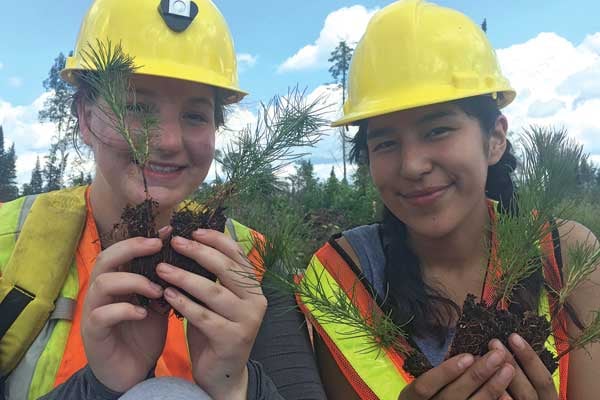Company wins gold in young worker safety category of Canada's Safest Employers awards

Dexterra’s Outland Youth Employment Program (OYEP) provides Indigenous youth with valuable work experience in their traditional territories. The six-week program takes place in six communities across Canada where participants are immersed in natural resource-based work, such as brush cutting, tree planting, camp maintenance and trail work for neighbouring parks. Each summer, approximately 150 Indigenous youth are employed through the program, and 500 youth have graduated from the program since its inception in 2000.
“We work in a lot of these communities and… we want to be able to provide opportunities for people who live in these communities as well,” says Lee-Anne Lyon-Bartley, vice-president of health and safety at Dexterra. “It’s the right thing to do… It’s an opportunity for young people who are still in high school, showing them the different opportunities that there are in the natural resources world.”
As part of the program, the youth receive a plethora of safety training around things such as tree planting, chainsaw safety, WHMIS, bear awareness and lake water and canoe safety. In addition, the youth are provided with a co-op binder, which contains even more training and safety activities. A lot of the training takes place within the very first week of the program.
“We recognize that we have teenagers with us for six weeks, so we want to make sure that we do thoroughly train then because, God forbid, we wouldn’t want anything to happen to any of our people but especially our young people that are just getting started in the working world,” says Lyon-Bartley. “What a horrible first impression if we didn’t provide the right training and safety.”
In addition to safety training, the program provides training opportunities to overcome barriers to employment including licensing, food safety, resumé and cover letter writing and transferable/soft skills such as time management, financial literacy and teamwork.
OYEP seeks to offer a holistic experience, which includes mental, physical, spiritual and emotional learning and safety. For example, the program includes education and training around mental health, social health, managing personal challenges and bystander intervention, when appropriate.
The program maintains a “safe space” that prohibits discrimination, criticism or harassment. To that end, elders are often on site, along with motivational speakers that focus on mental and spiritual health. Youth also regularly engage in cultural practices such as smudging, drum circles and talking circles.
“It’s great to give everyone an opportunity to come together to practise their spirituality because this job can be mentally draining since you’re away from home for six weeks, so it’s really nice to connect,” says Sage Moses, crew leader at the Mink Lake Camp in Atikokan, Ont.
To ensure these young workers are safe on the job, the safety committee (which meets weekly) offers a mentorship program. Youth are paired up with management for safety-specific activities, including camp walk-throughs, vehicle inspections, site inspections, filling out paperwork and re-stocking safety supplies. Each pair is responsible for specific tasks, which are later audited by the camp supervisor.
Additionally, all first-year OYEP participants are paired up with someone in their second year of the program.
“It really helps their safety because the second years are very comfortable now and they can tell when [the first years] are doing something unsafe,” says Moses. “Right away, they will make them stop and show them how to do it properly, rather than them doing something harmful that could hurt them.”
Management is also watching out for these young workers. Immediate managers show “true care and concern” for individual safety and well-being, says Lyon-Bartley, adding that district managers and the senior leadership team regularly conduct site visits, which demonstrates their commitment to safety.
Young workers are encouraged to bring up safety concerns whenever they arise — and Moses says they are not afraid to do so.
“We don’t want each other to get injured or cause any hazards around the camp and so they are very comfortable speaking to one another or bringing it to management,” she says. “They aren’t afraid to speak their mind.”
One initiative that is particularly effective in getting the youth involved in safety is Dexterra’s Don’t Walk By, Take Action Now approach. If a worker spots something that could be a hazard, they should feel empowered to not just walk by but rather stop and fix the problem. They record it on a form and, if they cannot fix the problem, it will be fixed by an appropriate person. In 2019 alone, more than 11,000 reports had been filed.
“It begins to change your psyche even because you really can’t just walk by something anymore and just leave it,” says Lyon-Bartley. “You find you have to do something, you have to take some sort of action, so that’s really where the power is to just make people stop putting blinders on and participate.”
The program also encourages positive reports, too, so good safety behaviour can be rewarded.
Something that is very important to Lyon-Bartley is to ensure the youth participating in OYEP have a strong understanding of their safety rights and that they bring that knowledge with them — and aren’t afraid to use it — when they graduate from the program.
“I tell them that, ‘In reality, when you go out into the working world, all employers are not going to be like this. I don’t want to sugarcoat it. You are getting all the training, all the support, but it’s not always going to be like that,’” she says. “I tell them, ‘If you find yourself in a situation where it’s not like that, don’t be afraid to speak up, don’t be afraid to call the Ministry of Labour.’”





